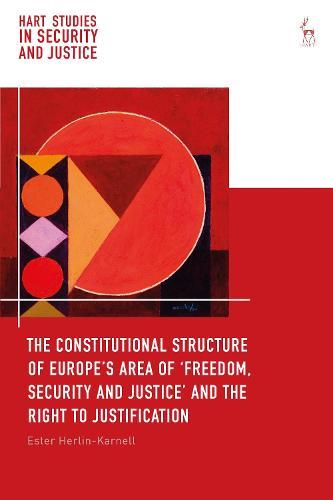Full Product Details
Author: Ester Herlin-Karnell (University of Gothenburg, Sweden)
Publisher: Bloomsbury Publishing PLC
Imprint: Hart Publishing
Weight: 0.442kg
ISBN: 9781509912490
ISBN 10: 1509912495
Pages: 200
Publication Date: 18 April 2019
Audience:
College/higher education
,
Professional and scholarly
,
Tertiary & Higher Education
,
Professional & Vocational
Format: Hardback
Publisher's Status: Active
Availability: Manufactured on demand

We will order this item for you from a manufactured on demand supplier.
Reviews
The analysis presented in the book provides more classic discussion points around the AFSJ with robust philosophical foundations. The conceptual richness of the volume sparks a number of follow-up questions that will be hopefully investigated in the future. This piece of scholarship fills a gap in the existing literature by offering a more systemic understanding of the functioning of the AFSJ, and offers an original angle to assess long-standing questions of constitutional relevance. -- Leandro Mancano * Common Market Law Review * Herlin-Karnell brings a different perspective to the table and points to the big picture, with well-articulated and compelling arguments that seek to advance the debate in the field of EU criminal law. -- Konstantinos Zoumpoulakis, Leiden Law School * New Journal of European Criminal Law * It is interesting how Herlin-Karnell connects the topics of non-domination theory, the right to justification and the proportionality principle. This is an added value indeed … the very many questions discussed, the thorough analysis of scholarship and case-law offer a very decent basis for further investigations in European criminal law. -- Attila Vincze, Andrassy University Budapest * Vienna Journal on International Constitutional Law *
The analysis presented in the book provides more classic discussion points around the AFSJ with robust philosophical foundations. The conceptual richness of the volume sparks a number of follow-up questions that will be hopefully investigated in the future. This piece of scholarship fills a gap in the existing literature by offering a more systemic understanding of the functioning of the AFSJ, and offers an original angle to assess long-standing questions of constitutional relevance. -- Leandro Mancano * Common Market Law Review *
The analysis presented in the book provides more classic discussion points around the AFSJ with robust philosophical foundations. The conceptual richness of the volume sparks a number of follow-up questions that will be hopefully investigated in the future. This piece of scholarship fills a gap in the existing literature by offering a more systemic understanding of the functioning of the AFSJ, and offers an original angle to assess long-standing questions of constitutional relevance. -- Leandro Mancano * Common Market Law Review * Herlin-Karnell brings a different perspective to the table and points to the big picture, with well-articulated and compelling arguments that seek to advance the debate in the field of EU criminal law. -- Konstantinos Zoumpoulakis, Leiden Law School * New Journal of European Criminal Law * It is interesting how Herlin-Karnell connects the topics of non-domination theory, the right to justification and the proportionality principle. This is an added value indeed ... the very many questions discussed, the thorough analysis of scholarship and case-law offer a very decent basis for further investigations in European criminal law. -- Attila Vincze, Andrassy University Budapest * Vienna Journal on International Constitutional Law *
Author Information
Ester Herlin-Karnell is Professor in EU Law, University Research Chair of EU Constitutional Law and Justice, and the Director of the VU Centre for European Legal Studies at the Free University of Amsterdam.




